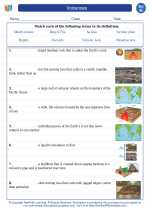Characteristics of Protozoa:
- Single-celled: Protozoa are made up of a single cell, which carries out all the functions necessary for the organism's survival.
- Eukaryotic: Their cells contain a nucleus and other membrane-bound organelles, distinguishing them from prokaryotic microorganisms like bacteria.
- Motility: Many protozoa are capable of movement using structures such as cilia, flagella, or pseudopodia.
- Nutrition: Protozoa are primarily heterotrophic, meaning they obtain nutrients by ingesting other organisms or organic matter.
- Habitats: They can be found in diverse habitats including freshwater, marine environments, soil, and as parasites within the bodies of other organisms.
Classification of Protozoa:
Protozoa are classified into various groups based on their mode of movement, reproduction, and other characteristics. Common groups of protozoa include:
- Amoebas: These protozoa move by extending their cell body and forming pseudopodia.
- Ciliates: Ciliates are characterized by the presence of hair-like structures called cilia, which they use for movement and feeding.
- Flagellates: These protozoa have one or more flagella, which are whip-like structures used for movement.
- Sporozoans: Sporozoans are typically parasitic protozoa that have complex life cycles involving sexual and asexual reproduction.
Ecological and Medical Importance:
Protozoa play crucial roles in ecosystems as primary consumers and decomposers. They contribute to nutrient cycling and are an important food source for many organisms. Additionally, some protozoa are parasitic and can cause diseases in humans, animals, and plants. Understanding their life cycles and ecological roles is important for managing disease transmission and maintaining ecosystem balance.
Studying Protozoa:
When studying protozoa, it is important to use microscopy to observe their morphology, movement, and reproductive structures. Additionally, molecular techniques such as DNA sequencing can be used to understand their evolutionary relationships and genetic diversity.
[Protozoa] Related Worksheets and Study Guides:
.◂Science Worksheets and Study Guides Eighth Grade. Volcanoes
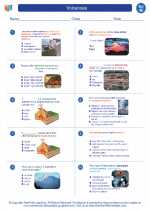
 Worksheet/Answer key
Worksheet/Answer key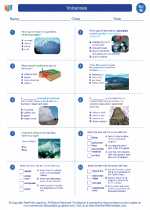
 Worksheet/Answer key
Worksheet/Answer key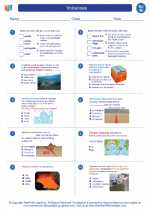
 Vocabulary/Answer key
Vocabulary/Answer key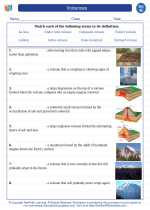
 Vocabulary/Answer key
Vocabulary/Answer key
 Vocabulary/Answer key
Vocabulary/Answer key